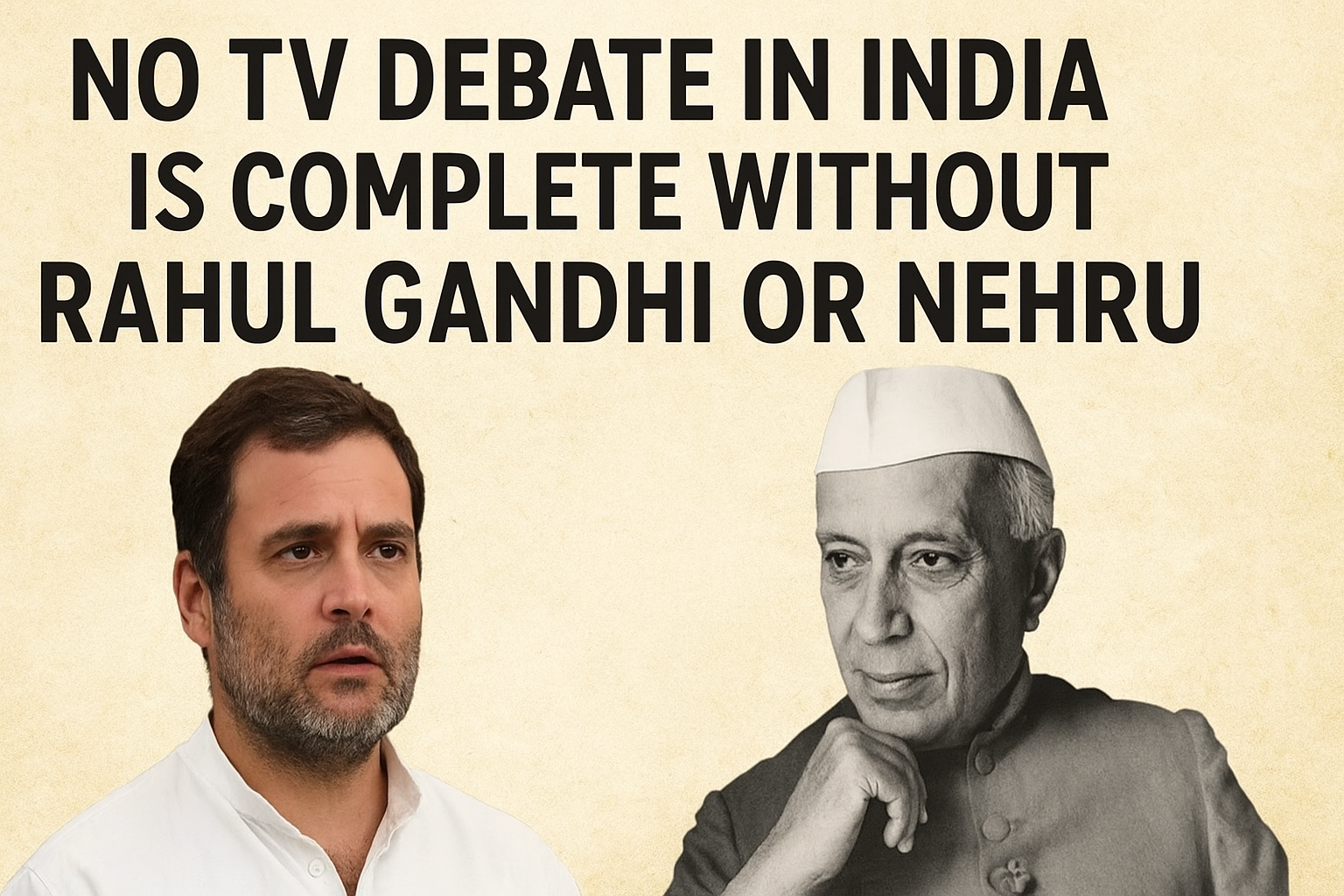
Switch on any Indian TV news channel during prime time and you will notice one pattern immediately. No matter what the subject of the debate is—be it economy, foreign policy, farmers’ issues, or even cinema—within minutes the discussion shifts towards two names: Rahul Gandhi and Jawaharlal Nehru. It often feels as if Indian television cannot complete a single program without these references. Why does this happen, and what does it say about our political culture and media today?
The Centrality of Politics in Media
In most democracies, TV news channels act as platforms for analyzing policies, highlighting governance, and debating social concerns. In India, politics dominates every evening slot. While some focus on development, a larger share of prime-time debates revolves around personalities. Viewers are drawn more to confrontations between party spokespersons than to detailed analysis of budgets or policy. This creates the perfect stage for names like Rahul Gandhi and Nehru to be invoked repeatedly, because they are symbols rather than just individuals.
Rahul Gandhi: The Current Focal Point
Rahul Gandhi is the present leader of the opposition and a constant target in television discussions. Whenever there is a debate on TV channels, his name is at the centre. Supporters project him as the face of the party’s revival, while critics dismiss him as inexperienced or ineffective. Even in debates unrelated to him—say, on inflation or unemployment—spokespersons from the ruling party often bring his name into the discussion. For them, Rahul Gandhi becomes an easy way to divert attention and put the Congress on the defensive. For channels, his name guarantees a strong reaction from panellists and ensures drama, which drives viewership.
Nehru: The Historical Reference
If Rahul Gandhi is the present, Jawaharlal Nehru is the past that refuses to leave prime time. As India’s first Prime Minister, Nehru shaped the early years of independent India. But in today’s debates, he is less discussed as a historical figure and more as a point of blame. From border issues with China to Kashmir, from socialism in economics to delays in industrial reforms, Nehru is accused of creating long-lasting problems. Whenever a ruling party spokesperson runs out of answers on present issues, invoking Nehru has become a common strategy. It shifts the debate from accountability today to controversies of the past.
The Strategy of Political Spokespersons
Television debates are often less about facts and more about perception. Spokespersons of parties know that blaming Nehru or mocking Rahul Gandhi achieves two goals. First, it excites their core supporters, who already see both as symbols of Congress failures. Second, it provokes the opposition spokespersons to respond defensively, which leads to heated exchanges. For television producers, such verbal fireworks mean higher ratings. This cycle explains why no debate seems complete without at least one mention of these names.
The Role of Anchors
Anchors play a crucial role in this pattern. Many anchors encourage panellists to bring up Rahul Gandhi or Nehru by asking loaded questions. They know that invoking these names creates clashes and keeps the debate alive. Instead of allowing a calm discussion on issues like climate change, education, unemployment and health care, the anchor often redirects the conversation towards a personality clash. As a result, the real topic is buried under shouting matches.
Why This Appeals to Viewers
Television debates are not purely about information. They are also about entertainment. For many viewers, the daily spectacle of politicians fighting on screen is addictive. Rahul Gandhi and Nehru serve as familiar names that trigger strong emotions—support or anger. Just as a cricket match is incomplete without mentioning greats like Sachin Tendulkar and Virat Kohli, TV debates appear incomplete without invoking the Nehru-Gandhi family. The repetition of their names has become a ritual that anchors and viewers have come to expect.
Impact on Public Discourse
The overuse of Rahul Gandhi and Nehru in debates has serious consequences. It reduces political discussion to personal attacks rather than issue-based analysis. When every policy failure or success is linked to one family, the larger structural questions are ignored. For example, instead of discussing the complex reasons for rising unemployment, debates may turn into shouting matches about Nehru’s economic model or Rahul Gandhi’s speeches abroad. This weakens the ability of citizens to understand the real challenges of governance.
A Missed Opportunity
India is a country of over 1.4 billion people with diverse issues—farmer distress, climate change, education quality, health infrastructure, gender equality, and digital economy. Each of these deserves serious debate. Instead, when channels spend 70 percent of their time dragging Nehru or Rahul Gandhi into the conversation, the opportunity to inform citizens is lost. It becomes more about scoring political points than solving problems.
Is Change Possible?
Some channels and programs do attempt issue-based discussions, but they struggle for ratings against high-decibel debates cantered on personalities. Unless viewers begin to demand more meaningful content, channels will continue this pattern. The responsibility lies partly with us as audiences. If we reward drama more than depth, anchors and spokespersons will happily supply it by repeating the same names night after night.
Final Take
The habit of dragging Rahul Gandhi and Nehru into every debate reflects both the state of Indian television and the nature of our political culture. Rahul Gandhi serves as the present target, while Nehru represents a convenient past to blame. Together, they guarantee confrontation, emotion, and viewership. But this practice narrows our public discourse and distracts from pressing issues that demand attention. If debates are to serve democracy, they must move beyond this obsession. Until then, no debate on TV in India will ever seem complete without the ritual of uttering either Rahul Gandhi or Nehru.





















